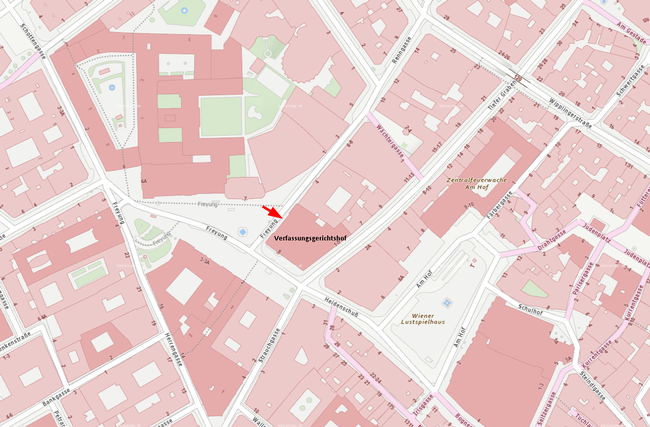The Court’s address is Freyung 8, 1010 Wien
Telephone: +43 (1) 53 122 0
Telefax: +43 (1) 53 122 499
You’ll find other extensions and e-mail addresses here.

The Court’s address is Freyung 8, 1010 Wien
Telephone: +43 (1) 53 122 0
Telefax: +43 (1) 53 122 499
You’ll find other extensions and e-mail addresses here.
If you want to visit the Court in person – in order to file an application with the Administrative Office or attend a public hearing – you can reach our location by public transport: either by the underground lines U3 (station Herrengasse) and U2 (station Schottentor) or by the bus lines 1A (stations Renngasse or Teinfaltstraße/ Freyung), 2A (stations Renngasse or Herrengasse), and 3A (station Renngasse).
You can find a map of all underground and bus lines in the first district here.

You’ll find Freyung 8 in Vienna’s City Map (ViennaGIS) here.
The main role of the Court is to ensure and verify compliance with the Constitution. On the one hand it is a “court of fundamental rights”, on the other hand it checks if the laws passed by parliament are within the framework of the constitution. You’ll find particulars of the Court’s responsibilities here.
In general, applications to the Court have to be in written form and, as a rule, drafted and submitted by a lawyer (obligation to be represented by a lawyer). In addition, a fee of €240 is charged. In specific circumstances, if you cannot afford a legal representative or the application fee, it is possible to apply for legal aid.
Your application can be filed electronically (see E-Government–Electronic Filing, Point 1.2), via post or personally at our Administrative Office. The Administrative Office of the Constitutional Court is open from 9.00 a.m. to 11.00 a.m. Monday to Friday. In general, your legal representative will assume responsibility for this step. Applications by fax are regarded as incomplete for lack of genuine signature. The signature has to be handed in subsequently. Please note that we do not handle applications by e-mail as they are inadmissible and legally void.
The Constitutional Court is obliged to handle every application that is filed. The President assigns the case to a member (a judge) of the Court. There is no fixed assignment of cases. In this respect, the President acts on the judges’ areas of expertise. The members of the Court who work and prepare a case for ruling are called “Referenten”(reporter). In case of an incomplete application (for instance if the signature of the legal representative is missing or the decision that is being challenged is not enclosed or attached) the Court issues a so-called commission for improvement (“Verbesserungsauftrag”). Afterwards the reporters prepare a draft decision. In many cases a preliminary proceeding is necessary. Thereby, the defendants - such as the involved authority - get the chance to react to the accusations stated in the application. In addition, the reporter can demand further material (records and documents).
If the information provided during the preliminary proceeding is insufficient or if the case is of public interest, the President schedules a public hearing. Together with the most important information about the case, the finished draft decision is then sent to the other members of the Constitutional Court. During law term (the so-called “Session”) all fourteen members of the Court come together in order to discuss and decide on the draft decisions. If a reporter’s draft obtains a majority, the case is therefore decided. The results of the sessions which may last for hours (besides the substance of the case, the wording of the ruling is discussed as well) are then incorporated. After the final scrutiny (“Endkontrolle”) by the President (which is tantamount to the release (“Freigabe”) of the ruling) the plaintiff receives the ruling.
The average length of a proceeding at the Constitutional Court is eight months, from the arrival of the application to the notification of the judgment or decision. However, the duration of the proceeding does not depend on the Court itself. The preliminary proceeding alone takes two months on average, since the parties involved must have the possibility to make an official statement. Occasionally, the decision depends on the course of other proceedings (for instance a Gesetzesprüfungsverfahren, in which laws are reviewed).
If you file a complaint against the ruling of an administrative tribunal, said ruling does not lose its effect until the Constitutional Court has reached a successful ruling. If, for instance, you contest a ruling in tax matters you have to comply with the fiscal authority’s demands in spite of your application to the Constitutional Court. In some circumstances – your legal representative will advise you accordingly – you can apply for “suspensory effect” for your proceeding. The Court can then grant suspensory effect if this is not “absolutely opposed to public interest” and, after having considered the public interest and the interests of other parties involved, if the implementation of the decision would be a “disproportionate disadvantage” for the plaintiff.
If your request for suspensory effect has been granted the ruling of the administrative tribunal that is contested at court is void for the time being.
In general, hearings at the Constitutional Court are public. In exceptional circumstances, if the security of the state is endangered, the public can be excluded from hearings. Basically, every individual interested in attending a hearing can do so at the Constitutional Court (Freyung 8, 1010 Vienna) depending on the seating capacity of the courtroom. However, film or sound recordings are prohibited. Information on sittings which are open to the public can be found on our Website, in the announcement section of the “Wiener Zeitung”, as well as on the notice board at the Court itself.
Groups are requested to announce their visit prior to the hearing.
House Rules (in German)
An application is refused (“zurückgewiesen”) if it is inadmissible. In this case, the review of the application has shown that the formal requirements were not met (for instance the eligibility of the appeal). The Constitutional Court does not deal with such cases. If an application is rejected (“abgewiesen”), the formal requirements were met, but the proceeding showed that the appeal was unfounded.
In Austria the Constitutional Court is the court of last resort. If a violation of the Convention of Human Rights is claimed, there is the possibility to appeal to the European Court of Human Rights (ECHR) in Strasbourg. It is not possible, however, to appeal to the Court of Justice of the European Union (CJEU) in Luxembourg.
No, it cannot. The prerequisite for the Constitutional Court to become active is always a filed application. This also applies if the Court initiates the review of a law (Gesetzesprüfungsverfahren). Moreover, the Court can initiate this review only if concerns have arisen during the discussion of a pending proceeding (and hence as a result of an application).
The Constitutional Court can review and rescind constitutional laws if they clash with the fundamental order of the Constitution (the so-called “building laws” of the constitution). First and foremost, these “building laws” include the democratic, republican, constitutional, and federal principles as well as the existence of an effective system of fundamental rights. The Constitutional Court first rescinded a constitutional law in 2001 (VfSlg. 16.327):
Written pleadings that initiate proceedings (especially applications according to Art. 144, lawsuits according to Art. 137, challenging elections according to Art. 141 B-VG, as well as applications pursuant to Art. 139 or 140 B-VG, declaring an act unlawful or a law unconstitutional), are subject to charges (charge pursuant to § 17a VfGG). The fee is 240 Euros.
The fee is directly debited to the account stated by your legal representative, if the application is filed by a lawyer via the Electronic File Management. Otherwise the fee must be paid (via payment slip or bank transfer) to the Finanzamt Österreich (Tax Authority Austria) with specification of a reference (IBAN: AT83 0100 0000 0550 4109 BIC: BUNDATWW).
The original payment slip has to be attached to your application and will be returned to you upon request. For each application a separate payment slip has to be produced. If an application pleads for the repeal of several decisions, the fee is charged each time. In accordance with the provisions on legal aid, a provisional exemption from payment of the filing fee may be requested at the time the application is filed.
Other applications (e.g.: written pleadings of parties involved, applications for legal aid, or subsequent applications for assignment to the Supreme Administrative Court) are not subject to a fee. There is no fee for the application for legal aid.
If you are not able to bear the costs of the proceeding without financial difficulty you can apply for legal aid. The Constitutional Court defines an income limit of approximately 1.300 Euros (net, without other maintenance obligation or assets), below which the costs of the proceedings would impair the applicant’s ability to meet his/her basic needs. The decision is taken on a case-by-case basis. However, it is crucial for the approval of legal aid that the legal application is manifestly without prospects of success. You can get an application form in our Administrative Office or download it online. The application for legal aid has to be filed with the Constitutional Court after carefully filling in the form and attaching the supporting documents. The application can be filed electronically, personally, or by post. You can find particulars regarding legal aid here.
The application for legal aid need not be signed by a legal representative. There is no fee charged in the first instance.
The flat rate for (successful) applications is:
2180 Euros
20% value added tax 436 Euros
Filing fee 240 Euros
A total of 2856 Euros covers the costs for legal representation (including in interlocutory proceedings in the judicial review proceedings and preliminary rulings).
The Constitutional law (Bundesverfassungsgesetz), its amendments, and other constitutional laws are promulgated by the Federal Chancellor in the Bundesgesetzblatt (Federal Law Gazette). If you want to read more than the legal texts published on the homepage, you can try the Legal Information System. In this database, operated by the Federal Chancellery, you can find the Constitution (especially federal laws in their current version). Apart from that, specialist publishers release current constitutional texts (from body of laws to commented additions), which can be consulted in public libraries.